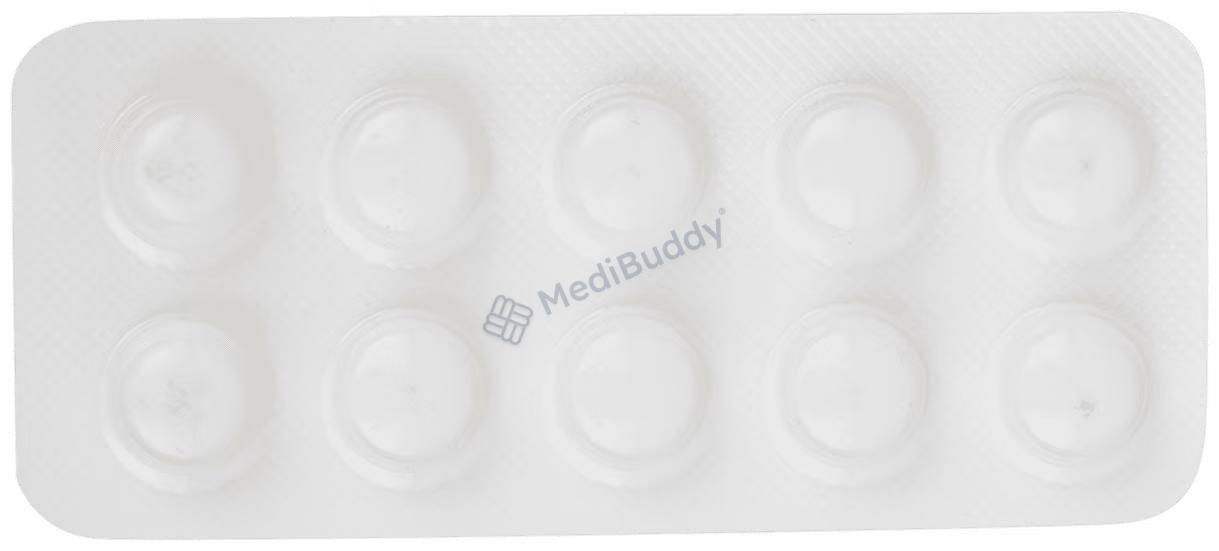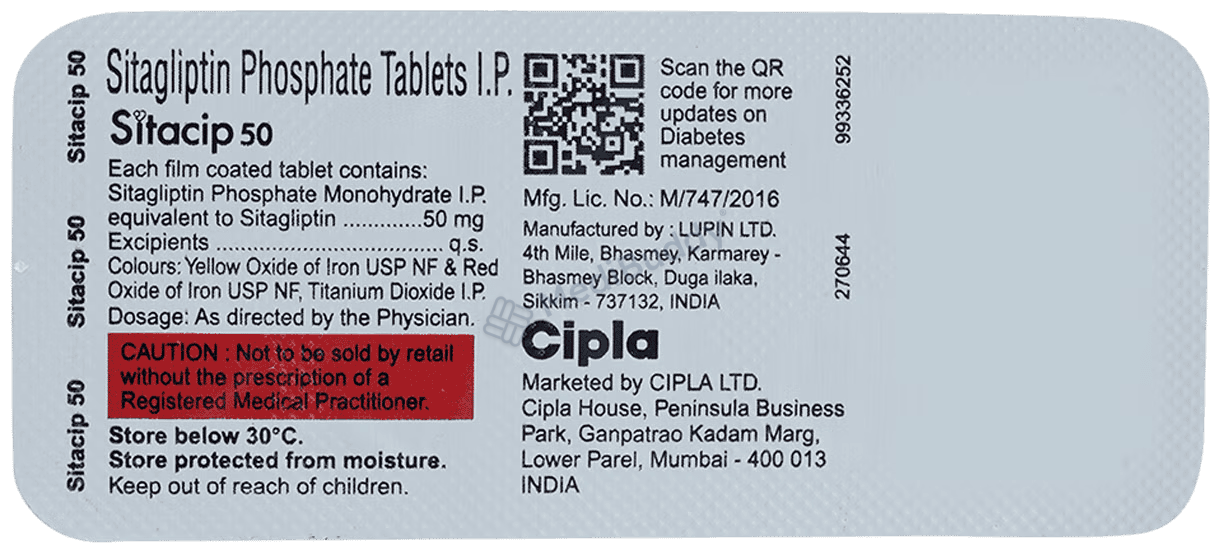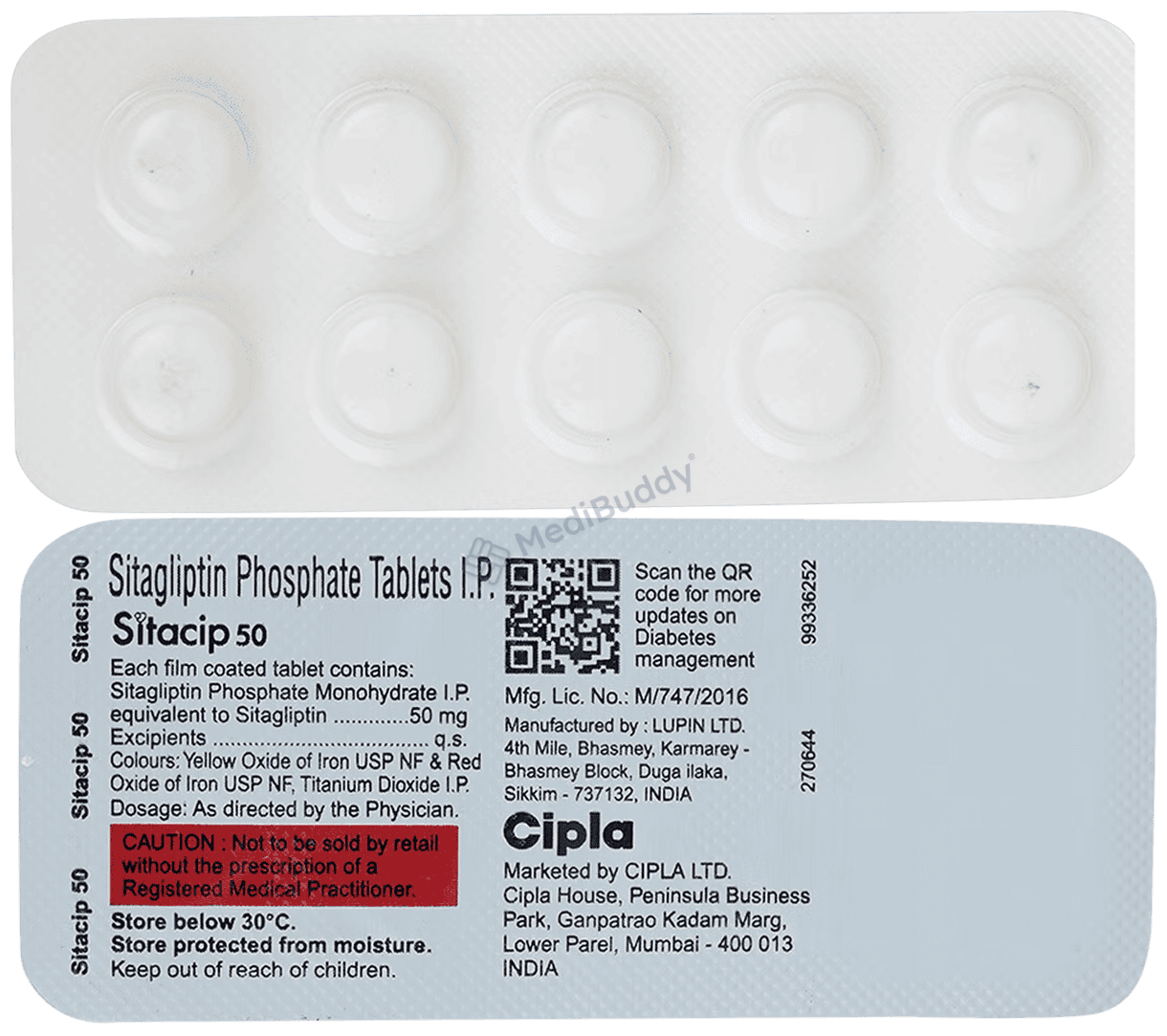Sitacip 50mg Tablet
By Sitacip
Rx
10 Tablet in a Strip

Composition
Sitagliptin(50mg)

Manufacturer - Cipla Ltd
Cipla House, Peninsula Business Park, Ganpatrao Kadam Marg, Lower Parel, Mumbai-400013

Expires on or after
September, 2026
About Sitacip 50mg Tablet
Sitacip 50mg Tablet is a medication designed to manage type 2 diabetes mellitus. It is an essential part of a treatment plan that includes a balanced diet and regular physical activity to regulate blood sugar levels. By keeping blood sugar levels in check, Sitacip 50mg Tablet helps mitigate the risk of severe diabetes-related complications such as kidney damage and vision impairment.
This medication is typically prescribed when lifestyle modifications, including diet and exercise, as well as other diabetes medications, do not effectively control blood sugar levels. Your healthcare provider may recommend Sitacip 50mg Tablet as a standalone treatment or in combination with other diabetes medications. The dosage prescribed will be tailored to your specific medical condition and blood sugar levels, so it is crucial to follow your doctor's instructions precisely.
Consistency is key when taking Sitacip 50mg Tablet. It is advised to take the medication at the same time each day to maximize its benefits. Unless otherwise directed by your doctor, it is important not to discontinue the medication abruptly. Sitacip 50mg Tablet plays a pivotal role in helping you manage blood sugar levels and prevent potential diabetes-related complications. Complementing the medication with the recommended diet and exercise regimen is essential as lifestyle factors greatly influence diabetes control.
While generally well-tolerated, the most commonly reported side effect of Sitacip 50mg Tablet is a headache, which typically subsides over time. Individuals taking Sitacip 50mg Tablet in conjunction with other diabetes medications like insulin or sulfonylureas should be cautious of low blood sugar levels (hypoglycemia) and understand how to recognize and manage it. In addition, upper respiratory tract infections such as sore throat, cough, and cold may occur as potential side effects. Should you experience persistent or concerning side effects, it is advisable to consult your doctor promptly.
Before initiating Sitacip 50mg Tablet, inform your doctor if you have a history of kidney disease, heart issues, pancreatic disorders, or if you consume alcohol regularly. Pregnant or breastfeeding individuals should seek medical advice before using this medication. It is essential to disclose all medications you are taking to your doctor, as certain medications may interact with Sitacip 50mg Tablet. Furthermore, limiting alcohol intake while on this medication is recommended to reduce the risk of low blood sugar levels. Regular monitoring through tests such as kidney function and blood glucose levels may be necessary to ensure the medication is effectively managing diabetes.
Benefits
Sitacip 50mg Tablet, a medication used in the treatment of Type 2 diabetes mellitus, belongs to a group of medicines known as DPP-4 inhibitors. By assisting in increasing the production of insulin in the body post-meal and regulating the release of glucose, Istavel helps in reducing blood glucose levels. This medication, typically taken once a day, has minimal common side effects and is not known to cause weight gain.
Maintaining lower blood glucose levels is crucial in managing diabetes effectively. By controlling these levels, individuals can significantly lower the risk of developing serious diabetes complications such as kidney damage, eye problems, nerve issues, and even the risk of limb amputation. Proper management of diabetes is also beneficial in reducing the risk of heart disease and stroke.
Sitacip 50mg Tablet works by inhibiting the action of DPP-4, an enzyme that breaks down the hormone 'Incretin.' Incretins help to produce insulin only when necessary and decrease the production of blood sugar by the liver when it is not required. By regulating blood sugar levels effectively, Sitacip 50mg Tablet plays a crucial role in preventing severe diabetic complications like retinopathy (eyesight loss), nephropathy (kidney disease), neuropathy (nerve damage), diabetic foot ulcer, and delayed wound healing.
To experience the maximum benefits of Sitacip 50mg Tablet, it is recommended to take the medication regularly as prescribed by your healthcare provider, in conjunction with a balanced diet and exercise routine. Continuous use of Istavel is essential as it not only helps in managing diabetes but also safeguards your future health, enabling you to lead a normal and healthy life.
How to use the Sitacip 50mg Tablet
When using Sitacip 50mg Tablet, it is important to follow the instructions provided by your doctor. Swallow the tablet whole with a glass of water. Avoid chewing, crushing, or breaking the tablet as it may affect its effectiveness. You can take Sitacip 50mg Tablet with or without food, but it is advisable to take it at the same time every day for better results. Your doctor will determine the right dosage and duration based on factors such as your age, body weight, and specific medical condition. If you have any questions or concerns about how to use Sitacip 50mg Tablet, consult your physician for guidance.
Uses of Sitacip 50mg Tablet
Uses of Sitacip 50mg Tablet
Sitacip 50mg Tablet is primarily used for the treatment of Type 2 diabetes mellitus in adults. It is specifically formulated to help manage the symptoms of this common condition by regulating blood sugar levels effectively. By targeting Type 2 diabetes mellitus, Sitacip 50mg Tablet plays a crucial role in the overall management of this condition and helps individuals lead a healthier life.
What conditions Sitacip 50mg Tablet treats?
Sitacip 50mg Tablet is used in the treatment of type 2 diabetes. Type 2 diabetes happens when the body doesn't produce enough insulin or doesn't use the insulin effectively, leading to high blood sugar levels. Symptoms may include increased thirst, frequent urination, slow wound healing, increased hunger, fatigue, blurred vision, and sometimes weight changes. Complications of type 2 diabetes can involve nerve issues, kidney problems, eye damage, limb loss, sexual problems, and a higher risk of heart attack or stroke.
Should you consult a doctor?
If you experience inflammation of the pancreas, gallstones, high levels of fat in the blood, type 1 diabetes, or diabetic ketoacidosis while using Sitacip 50mg Tablet, it is crucial to seek immediate medical attention. These conditions may require medical intervention and monitoring to ensure your health and safety. Inform your doctor promptly if you encounter any of these issues to receive appropriate medical guidance and care.
Side effects of Sitacip 50mg Tablet
Sitacip 50mg Tablet may cause some side effects, but most of them are mild and temporary. These side effects include nasopharyngitis, which is inflammation of the throat and nasal passages, as well as headaches and hypoglycemia, which is low blood glucose level. You may also experience an upper respiratory tract infection, nasal congestion, joint pain, stomach pain, and gastrointestinal issues like diarrhea, constipation, nausea, flatulence, and vomiting.
Additionally, some uncommon side effects of Sitacip 50mg Tablet include itching, signs of low blood sugar such as drowsiness, irritability, hunger, dizziness, confusion, sweating, weakness, and fast heartbeat. It may also lead to stuffy or runny nose, sore throat, or signs of reduced platelet count such as easy bleeding or bruising. If you experience severe and continuous stomach pain that may spread to your back, signs of pancreatitis, or symptoms of a serious allergic reaction like rash, hives, blistering, swelling of the face, lips, tongue, and throat, you should stop taking Sitacip 50mg Tablet immediately and seek medical help. In rare cases, you may also observe bullous pemphigoid symptoms like skin blistering, which require prompt medical attention. If any of these side effects persist or concern you, consult your doctor for further guidance.
Safety advice

liver
Sitacip 50mg Tablet is considered safe for individuals with liver disease based on the limited available data. It is indicated that adjusting the dose of Sitacip 50mg Tablet may not be necessary for these patients. It is important to consult with your doctor before use. However, it is advised not to use Sitacip 50mg Tablet in patients with severe hepatic impairment as its effects have not been studied in this population.

kidney
Sitacip 50mg Tablet requires caution in severe kidney disease; dosage adjustments may be necessary. Consult your doctor.

alcohol
It is unsafe to drink alcohol while taking Sitacip 50mg Tablet. Alcohol may interact with the medication and cause harmful effects. Consult your doctor if you have any questions about alcohol consumption with Sitacip 50mg Tablet.

driving
When using Sitacip 50mg Tablet, avoid driving if you experience symptoms of low or high blood sugar that affect focus and reaction time.

pregnancy
Information on the use of Sitacip 50mg Tablet during pregnancy is not available. Please consult your doctor.

breastfeeding
It is advisable to avoid using Sitacip 50mg Tablet while breastfeeding. Limited data indicates potential harm to the baby through breastmilk passage.
Age above 75(Geriatrics)
Sitacip 50mg Tablet should be used with caution in elderly patients. Consult your doctor before taking Sitacip 50mg Tablet.
Age below 6 months(Pediatrics)
Sitacip 50mg Tablet is not recommended for use in children and adolescents under 18 years of age. Consult child’s doctor for advice.
Consumption warning before consuming Sitacip 50mg Tablet
Before you start taking Sitacip 50mg Tablet, make sure to inform your doctor if you have had any allergic reactions to sitagliptin, other medications, foods, or any of the components present in the tablet. It's important to note that prolonged use of Sitacip 50mg Tablet can lead to acute pancreatitis and serious kidney issues. Be cautious, as there is a higher risk of hypoglycaemia (low blood sugar) when Sitacip 50mg Tablet is combined with other anti-diabetic medications or insulin therapy. Your doctor may need to adjust the dosage accordingly. Some patients may experience severe allergic reactions such as anaphylaxis, angioedema, and skin conditions like Stevens-Johnson syndrome while taking Sitacip 50mg Tablet It is crucial to avoid giving Sitacip 50mg Tablet to children under 18 years old since its safety and efficacy have not been established in this age group. If you are also taking digoxin for heart-related issues, close monitoring is necessary due to potential severe drug interactions.
Disease interactions
When taking Sitacip 50mg Tablet, it is important to be cautious if you have a history of pancreatitis or pancreatic disease. Patients with these conditions should use Sitacip 50mg Tablet carefully to avoid any potential complications. Additionally, patients with renal dysfunction should also exercise caution when using this medication. It is advisable to consult with a healthcare provider before starting Sitacip 50mg Tablet if you have a history of pancreatitis/pancreatic disease or renal issues to ensure safe and effective use of the medication.
What if you forgot to take Sitacip 50mg Tablet?
If you forget to take your Sitacip 50mg Tablet at the scheduled time, try to take it as soon as you remember. But if it's close to the time for your next dose, just skip the missed one and continue with your regular dosing routine. Avoid taking a double dose to make up for the missed one. It's important to stay consistent with your medication schedule for the best results.
What happens if you take overdose of Sitacip 50mg Tablet?
If you or someone else takes more Sitacip 50mg Tablet than prescribed, it is considered an overdose. In the case of an overdose, it is important to seek medical help promptly by consulting your doctor or going to the nearest hospital. Immediate medical attention can help address any potential complications that may arise from taking too much of this medication. It is crucial to follow the recommended dosage instructions for Sitacip 50mg Tablet to avoid the risks associated with an overdose.
Related lab tests
When taking Sitacip 50mg Tablet, it is important to monitor your blood glucose levels regularly. The following lab tests are recommended to assess your glucose control effectively:
1. Glucose - Fasting Blood: This test measures your blood sugar levels after an overnight fast. It helps evaluate your baseline glucose levels.
2. Glucose - Postprandial Blood: This test checks your blood sugar levels 2 hours after a meal. It provides valuable insight into how your body processes glucose.
3. Glycosylated Hemoglobin: This test, also known as HbA1c, reflects your average blood sugar levels over the past 2-3 months. It is a good indicator of long-term glucose control.
Additional Information
| Habit Forming | No |
| Chemical Class | Pyrazine-derivative |
| Therapeutic Class | ANTI DIABETIC |
| Action Class | DPP-4 inhibitors |
FAQs
Disclaimer
The information provided on this website is to the best of our abilities to ensure it is accurate, reliable, and reviewed by a team of professionals. It should not be used to diagnose, prevent, or cure any health problem. The information presented here is not intended to create a doctor-patient relationship or replace a registered medical practitioner's advice, diagnosis, or treatment. The absence or provision of any information or warning regarding any medicine should not be assumed as an implied or explicit assurance of safety or efficacy. We highly recommend consulting your registered medical practitioner for all queries or doubts related to your medical condition. Do not ignore professional medical advice or delay seeking it based on the content encountered on our website. We intend to support, not replace, the doctor-patient relationship.
₹88.11
₹97.9
10% OFF
Inclusive of all taxes
Content verified by

Dr. Upasana Bhatia
MBBS - General Medicine
Last update on 01-Oct-2024


